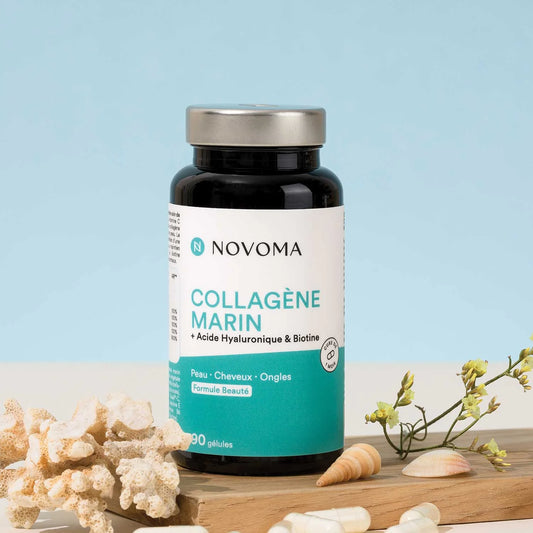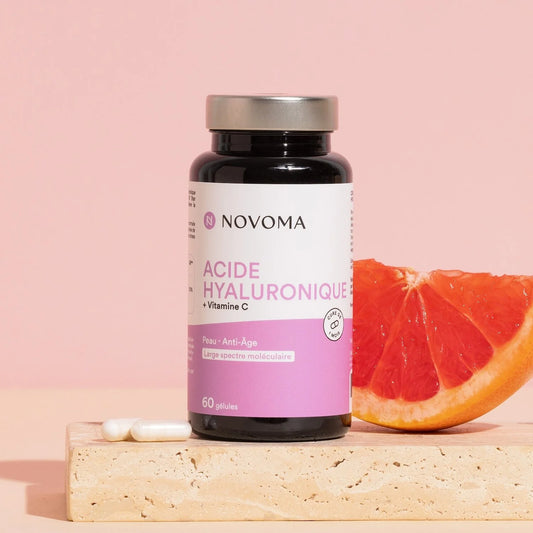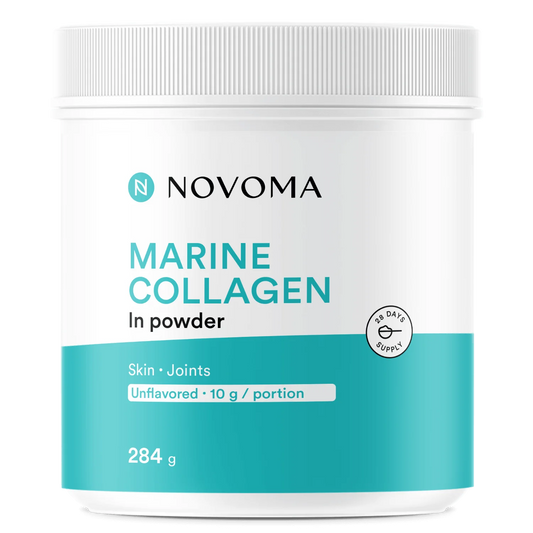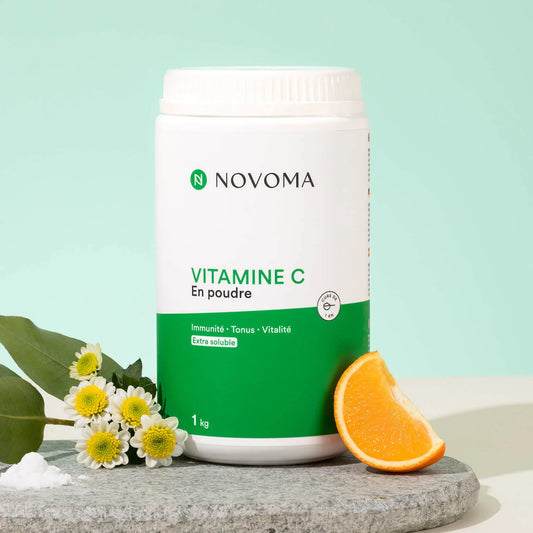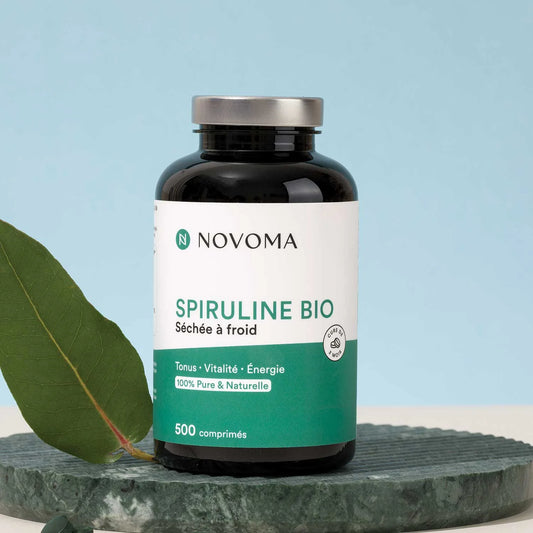
Our best tips for enriching your diet with collagen!
Summary
It is a reality that cannot be escaped: a course of food supplements always comes in addition to a suitable diet!
And since collagen is all the rage, we'll explain how to combine a pro-collagen diet and food supplements to benefit from its many benefits!
What is Collagen?
If collagen has been a star nutrient for a few years, a reminder of its definition and its functions for the body are never too much. Explanations 👇
Collagen: the key protein for beautiful skin, healthy bones and joints
Collagen is a fibrous structural protein , representing 80% of the body's proteins and an essential component of connective tissues. In other words, all the tissues that hold other tissues in the body together.
👉 Connective tissues include tendons, ligaments, bones, cartilage, skin, and fatty tissue.
Logically, collagen ensures the maintenance of a large number of body functions:
✔️ Resistance of ligaments to stretching;
✔️ Joint flexibility;
✔️ Strength of the appendages (nails);
✔️ Hair quality and shine;
✔️ Tonicity, suppleness… and beauty of the skin!
… It’s hard to do without this essential protein! And since all good things come to an end, its production by the body does not last ad vitam eternam … 🥸
How does collagen synthesis work throughout life?
Unlike other proteins synthesized throughout life (such as Tyrosine for example), collagen production by fibroblast cells decreases from around the age of 25, with an impact that is impossible to ignore.
The effects of decreased collagen in the body?
-
Loss of suppleness and tone of the skin;
-
Appearance of wrinkles and fine lines on the face (and the rest of the body);
-
Reduced resistance of tendons and ligaments to stretching;
-
Increased risks of bone fragility;
-
Joint discomfort during and outside of exercise;
-
Alteration of the quality of hair and nails (more fragile, dull, brittle).
☝️ Do you notice a lack of fluidity in your movements ?
You might be interested in our article on the best food supplements for joints !

What diet should you adopt to stimulate collagen production?
The foundations are laid, let's get down to business: here's how to enrich your diet with collagen to make the most of its benefits... Despite the years that go by!
Animal proteins: the number 1 source of collagen in food!
Since collagen is found in the body's connective tissues, meats and other animal proteins are an excellent source of it.
Here are the collagen-rich foods to favor:
👉 “Hard” meats (containing bones and tendons, or skin): roast, beef chuck, chicken thighs and drumsticks, etc.;
👉 Bone broth: prepared from the bones and cartilage of simmered meats;
👉 Skin (and bones) of fresh and salt water fish: salmon, sardines, eel, etc.
The gourmet minute : bone broth is an old-fashioned dish that is coming back into fashion, allowing you to use leftover meat or fish carcasses to make a protein-rich, inexpensive and tasty dish . As long as you prepare it at home and make sure where the meat comes from.
Other foods are also interesting because they contain the same amino acids as collagen (glycine, proline and hydroxyproline): eggs, dairy products or soy (tofu for example).
Foods rich in Vitamin C to support collagen formation
Thanks to its important role in the synthesis and stability of collagen fibers, Vitamin C is THE vitamin to rely on, and it starts on your plate!
Consider including it in your diet: peppers, citrus fruits, kiwis, red fruits (strawberries, blackcurrants, blueberries), spinach, kale, broccoli.
How does Vitamin C play a role in collagen formation?
👉 It is a cofactor of two enzymes (prolyl hydroxylase and lysyl hydroxylase), which contribute to the synthesis of stable and functional collagen fibers by hydroxylation.
👉 It has antioxidant properties that help fight oxidative stress in cells and promote tissue repair.
A diet rich in Zinc and Copper to support collagen production
Zinc and copper are two essential trace elements for the body, and are only provided through food. They play an important role in supporting collagen production !
Foods richest in Zinc:
-
Oysters;
-
Lean beef;
-
Wheat germ;
-
Cashew nuts;
-
Flax seeds.
Foods richest in Copper:
-
Certain fish and shellfish (oysters, squid, salmon, etc.);
-
Offal (calf's liver);
-
Spirulina;
-
Oilseeds (cashew nuts, Brazil nuts, hazelnuts, sesame seeds);
-
Unsweetened cocoa powder.
How do Zinc and Copper impact collagen synthesis?
👉 Zinc contributes to bone mass formation and cellular activity, including collagen production;
👉 Copper is a cofactor of the enzyme lysyl oxidase, which is crucial for the formation of collagen and elastin in connective tissues.

Why and how to supplement with collagen?
It's not always easy to have a perfect diet every day, and to top it all off, fully assimilated nutrients. A diet rich in collagen helps, but taking the right food supplements could optimize your efforts.
What are the different forms of collagen supplements?
When it comes to collagen in food supplements, we distinguish between the native form (native collagen) and the hydrolyzed form (or collagen peptides).
➡️ Native collagen : this is the most “raw” form and not broken down after extraction. It has a high molecular weight, making it more difficult to assimilate. Its advantage? Native collagen food supplements are often less expensive, because the manufacturing process is less complex.
➡️ Hydrolyzed collagen : also called collagen peptides, hydrolyzed collagen is obtained by a process of breaking down collagen into very low molecular weight molecules (peptides). This low molecular weight facilitates the assimilation of collagen by the body. Soluble in water, peptides also have greater bioavailability!
For the sake of quality and greater efficiency, we have taken the time to formulate a hydrolyzed (and local!) marine collagen, extracted from fish cartilage from sustainable fishing! 🐟
👉 Are you curious? Discover our article on the differences between native marine collagen and hydrolyzed marine collagen, we tell you everything.
What are the benefits of marine hydrolyzed collagen?
On the benefits side, remember that taking a collagen supplement (or any other supplement) is only relevant if your diet is also right!
✅ Skin Benefits : It can improve skin elasticity and hydration, and can fight the appearance of wrinkles.
✅ Hair nutrition : Collagen can improve hair quality and the strength of hair fibers through its action on the scalp.
✅ Nail care : Collagen can support nail strength and growth
✅ Joint well-being : Collagen can contribute to the reduction of joint discomfort and the regeneration of cartilage.
✅ Sports recovery : Collagen can facilitate muscle regeneration if you are a sports enthusiast.
It is these different advantages that led our team to choose Naticol® marine collagen produced in Tarn, combined with Vitamin C to maximize its effectiveness.
We recommend you
Marine Collagen Powder
Hydrolyzed Marine Collagen Powder Type I & III.
- ✅ Fine powder easy to dissolve
- ✅ Available in 3 flavors
- ✅ 1 month treatment
- ✅ Made in France 🇫🇷
How to combine diet and collagen supplements on a daily basis?
Do you want to follow a collagen treatment? Here is our advice to maximize its effectiveness with a suitable and tasty diet.
Our practical advice for enriching your diet with collagen
👉 Protein at every meal by focusing on lean meats. For variety (or for vegetarian diets) think about eggs, tofu and lentils! Count at least 0.8 to 1g of protein / kg of body weight, more if you do sports.
👉 Seasonal fruits and vegetables rich in Vitamin C : oranges, red fruits, kiwis, broccoli.
👉 Foods rich in Zinc and Copper : oysters, slice of calf's liver (if you like), dark chocolate.
The complete pro-collagen recipe idea : a lentil salad with hard-boiled eggs, garnished with chopped hazelnuts and orange segments. And enjoy!
What dosage and timing should be followed to optimize the absorption and effectiveness of collagen supplements?
Regarding the ideal dose of collagen, 10 g is the daily reference to ensure sufficient effectiveness.
As for the question “when to take collagen”, there is actually no ideal time, the answer depends on your personal preferences! The time of taking has no impact on its assimilation.
Our advice :
✅ Natural or flavored Marine Collagen Powder : in a yogurt, smoothie or fresh juice in the morning
✅ Marine Collagen in capsules : at the same time as your other supplements if you take them, during a meal, for example.
You probably guessed it: a collagen cure will never work miracles without a suitable diet, but we sincerely believe that the combination of the two can help to soften the consequences of the years that pass (and quickly!) 🫂
FAQ
What is the food richest in collagen?
Collagen mainly contains amino acids (glycine, proline and hydroxyproline), present in large quantities in animal proteins (chicken, beef, fish, egg).
How to increase collagen naturally?
Since collagen synthesis decreases from the age of 25, the only option is to focus on a diet rich in collagen, and to emphasize Vitamin C and Zinc, which influence its production.







